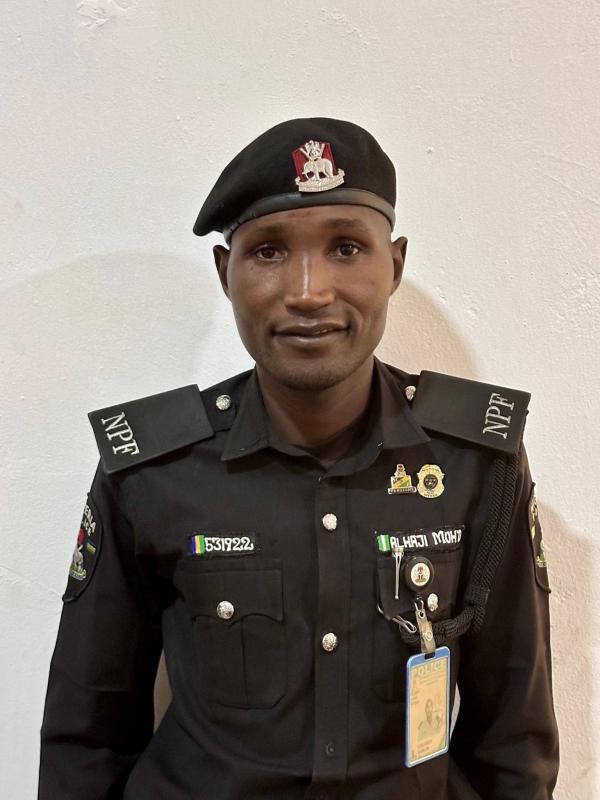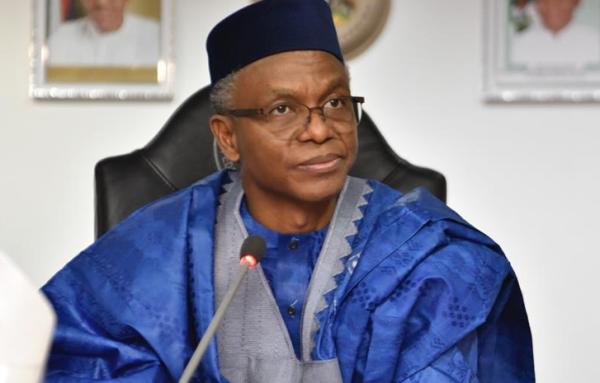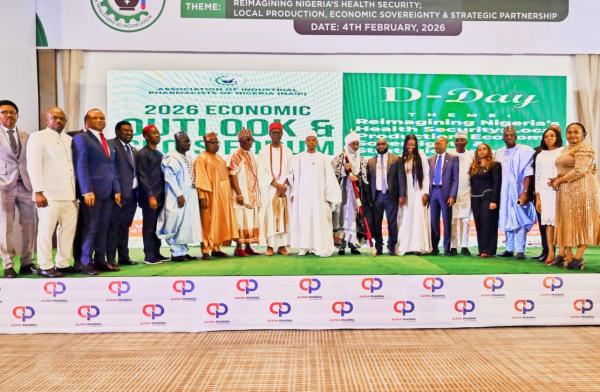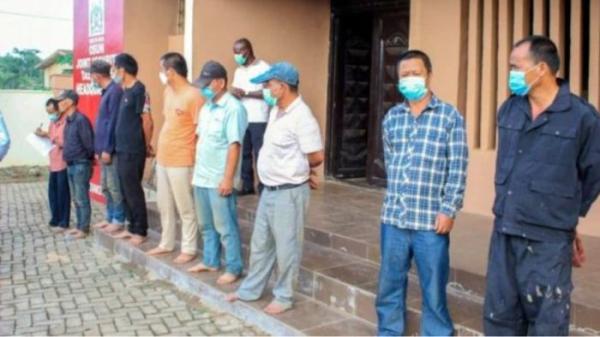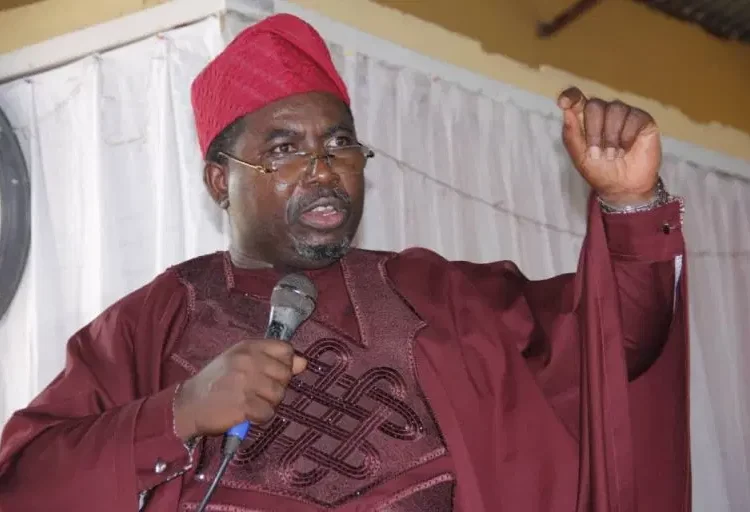
Allege $50,000 bribe per legislator to quash debate
Senate confirms money belongs to govt
Muhammad Bello and Omololu Ogunmade in Abuja
All Progressives Congress (APC) lawmakers in the House of Representatives yesterday alleged that the federal government had ill motives in the $9.3 million cash-for-arms deal.
This is as they angrily deserted the chamber when the Deputy Speaker Hon. Emeka Ihedioha, refused to entertain a debate on a motion seeking the probe of the deal, alleging that some members of the House had each received a $50,000 bribe to quash the motion.
This was contrary to the rules of the House which stipulate that when a matter has been moved by way of a motion, the presiding officer shall allow those who want to speak for and against the motion.
The APC Caucus noted “the attempt by the ruling party members to sweep the controversial smuggling of $9.3 million in cash allegedly meant to procure arms and ammunition from a security outfit in South Africa under the carpet”.
The motion, which was sponsored by Hon. Kawu Sumaila (APC, Kano), was first tabled on the floor of the House last week but was not passed.
Yesterday again, Kawu raised a point of order under matters of urgent national importance calling attention to what he termed “the scandalous smuggling of $9.3 million in a private jet belonging to the President of the Christian Association of Nigeria (CAN), Ayo Oritsejafor”.
Moving the motion, Kawu stated that “while many South African security agencies, including the National Prosecuting Authority are involved in the matter because of its gravity, nearly all the relevant Nigerian agencies, especially the Federal Airports Authority of Nigeria (FAAN), the Nigerian Airspace Management Authority (NCAA), and the Nigerian Customs Service (NCS) do not have any information on the matter”.
Ihedioha however stated that debating the motion was not necessary given the security implications of the subject matter.
“My dear colleagues, I sincerely believe that this motion, if passed, should go to the Joint Committees of the House on National Security and Defence for appropriate action – should it pass the question. But a debate on this is not necessary given its security implications,” he said.
The deputy speaker ruled against the motion after Hon. Jumoke Okoya Thomas (APC, Lagos) seconded it.
Also, a majority of the Peoples Democratic Party (PDP) members indicated that there was no need to debate the motion, thereby prompting the walkout by the APC Caucus.
Outside the green chamber, however, the House Minority Whip, Samson Osagie, who spoke on behalf of his colleagues from APC, told journalists: “There is no provision in the rules or in the constitution of Nigeria that disallows any motion that has already been moved from being debated on the floor of the House. What we find today is strange to parliamentary procedures and we will not accept it.”
He said they staged the walkout because they discovered that there was a deliberate attempt, bordering on an alleged bribe of $50,000 given to each sympathetic legislator, to quash the debate on the motion.
According to Osagie, the issue was scandalous, disgraceful and appalling, thus warranting the intervention of the opposition legislators, who he said believe strongly in reducing corruption in the country.
“There is no denying the fact that given the circumstances of this transaction, there were ill motives and they cannot be unassociated with money laundering or an attempt to steal money belonging to the people of Nigeria up to the tune of N1.5 billion or $9.3 million,” Osagie said.
“We are all aware that a week ago or so, the South African government impounded an aircraft purportedly belonging to a top religious leader in this country that was used to carry $9.3 million. The notes were said to be in mint condition and had never been used,” Osagie recalled.
He faulted the federal government’s justification for the deal, “which it said was meant for the purchase of arms and ammunition for the purpose of fighting the insurgency”.
He wondered if it was faster or safer to do an international transaction of such magnitude by ferrying cash across the continent or simply wire a transfer that can go through in a matter of seconds or a few hours.
Other pertinent questions the legislators raised were: “Why was the deal not at inter-governmental level? Why, if South Africa was aware of the deal, did Nigeria not make adequate arrangements for the receipt of the cash by the recipients? Why was the money belonging to the federal government and meant for the purchase of equipment for the federal government moved by a private jet when we have over five to six airplanes in the presidential air fleet?”
The APC lawmakers equally wanted to know why the money was not accompanied by officials from the Office of the National Security Adviser (ONSA) and Department of State Security (DSS).
They also sought answers as to why the government flouted its own law on the declaration of cash and why diplomatic channels were not explored to secure the deal.
The caucus also asked: “Why would the government of Nigeria seek to smuggle $9.3 million? A country that is regarded as the giant of Africa smuggling about N1.5 billion; in a country where its citizens are wallowing in poverty the amount was smuggled for unexplained reasons?
“Is it just a wicked coincidence that the aircraft belonging to a personal friend and an unapologetic ally of the president in the person of the Chairman of the CAN was used to smuggle the cash?
“If contrary to the above posers, the transactions were contracted out to a private company in Nigeria, does it amount to money laundering under our laws for the federal government to have allowed individuals to attempt to pay for the equipment with cash without passing through financial institutions?”
Further condemning the entire process as “unacceptable, unethical and illegal”, the legislators insisted that the federal government owes the Nigerian people an explanation as to where the money came from and the purpose for which it was meant.
“We call on the federal government to tell Nigerians why it had to do what it did and there is no amount of official intimidation, official harassment of the good people of this country and those who intend to speak on this matter that would cover up this transaction that is clouded in illegality and illegitimacy”.
When reminded that this was not the first time motions were stood down, Osagie explained that the House had “agreed that matters that border on infrastructure development should not be subjected to debate so as to allow time for other issues. I must confess to you that under our rules, issues of security are not part of it. The rules of the House are clear”.
“This matter is already in the public domain. So what is sacrosanct in members of the parliament who hold the mandate of the Nigerian people discussing such an issue?” he wondered.
But the situation was different in the Senate yesterday when the issue of the $9.3 million reared its head, as the Senate confirmed that the cash flown to South Africa belongs to the Nigerian government.
This confirmation was made by the Chairman, Senate Committee on Defence, Senator George Sekibo, after a two-hour closed door meeting with service chiefs in the National Assembly.
Following the arrest of the two Nigerians and the Israeli by the South African government for allegedly smuggling the money into the country, the federal government promptly claimed its ownership, saying it was meant to purchase arms for the military.
But some Nigerians have alleged that the federal government’s claim was a mere attempt to cover up the truth behind the controversy.
Unexpectedly, the controversy surrounding the money and its seizure compelled the Senate committee to summon the National Security Adviser, Col. sambo Dasuki (rtd.), Chief of Defence Staff, Air Chief Marshall Alex Badeh and Chief of Army Staff, General Kenneth Minimah, to brief it on all they knew about the money.
At the end of the meeting, which was attended only by Badeh and Minimah, the two service chiefs kept mum but Sekibo disclosed that from submissions at the meeting, it was clear that the money belonged to the Nigerian government.
Sekibo who said the meeting went well, added that investigations on the money were still ongoing.
“The meeting went very well. There are several questions here and there and we are digging to find out details and facts about what happened. The committee is satisfied that we are on top of the matter.
“We are still investigating. We have started the investigation. When we get through the investigation, we will brief you. The money belongs to the Nigeria government,” he said.
Sekibo also denied speculations that the Senate was under pressure to intervene in the sentencing of 12 soldiers to death by the Nigerian Army for mutiny, saying the court martial would instill discipline in the Army.
He said: “No, we are not intervening because the armed forces is established by an Act of the National Assembly. The Act spells out categorically the conduct of the soldiers and the way they are to behave wherever they are.
“If you join the military, that Act is to guide you and your conduct. If you go contrary to any of the prescribed sections of the Act, the punishment prescribed for the Act that you violate will be enforced. So the military did not just wake up one day and say that they were going to kill Mr. A or Mr. B.
“They went through the necessary processes and they found them guilty.
But I think that those found guilty also have a way out. They can go on appeal and if the appeal finds them not guilty, that will be it.
“But for what the military has done, they have done the best thing because you must instill discipline in the armed forces. If you don’t do so, one day, all of us here will be sacked and you will not hear of this place again. So I think we should encourage the military.”












